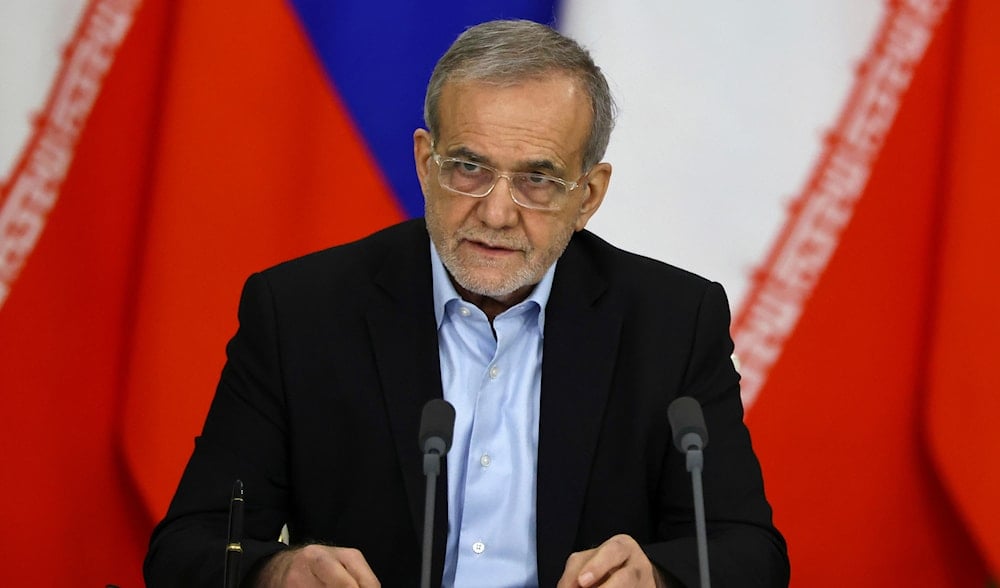Pezeshkian calls for multipolarism, defends nuclear rights: CGTN
In a CGTN interview, Pezeshkian urged supporters of multipolarism to unite, praised China’s leadership, and defended Tehran’s peaceful nuclear activities and medical research.
-

Iranian President Masoud Pezeshkian speaks during a signing ceremony with Russian President Vladimir Putin at the Kremlin in Moscow, Russia, on Jan. 17, 2025. (AP)
In an interview with Chinese state television, Iranian President Masoud Pezeshkian urged countries that support multipolarism to unite against the forces of unilateralism, defended Tehran’s peaceful nuclear activities, and warned against attempts to coerce states through force and sanctions.
Pezeshkian said that if supporters of multipolarism do not stand together, “supporters of unilateralism will overpower them,” recalling Chinese President Xi Jinping’s proposal for global governance as an idea that requires intergovernmental cooperation “without any discrimination between small and large, rich and poor states.”
The president criticized selective international engagements and “double standards,” saying unilateral actors seek to keep other countries constrained “through force and sanctions.”
He praised China’s development model as one based on “unity, harmony, decisive leadership, and carefully planned scientific policies,” and commended China’s political approach to overcoming unilateralism in favor of multipolar cooperation.
On regional and strategic roles, Pezeshkian said that given China’s leadership and standing, it “can play an effective role in the region” and help implement objectives agreed upon in international organizations. He also expressed expectations that the 25-year strategic agreement between Iran and China will be fully implemented.
On 'Israel' and the West
Pezeshkian sharply criticized the conduct of the Israeli entity, accusing it of violating laws and acting with impunity. He also accused Western states of hypocrisy over the nuclear deal, recalling how after the US withdrawal from the 2015 accord, Europeans “did not keep their commitments,” yet those same countries now accuse Iran of non-compliance.
He further highlighted that while Iranian negotiators were at the table, they faced attacks supported by the US, arguing this demonstrated a preference for imposing logic by force rather than argument. “We will not submit to force,” he said, adding that Iran “will not and did not start a war, but if attacked, we will defend ourselves forcefully.”
Nuclear activities: peaceful, transparent, and a right
Pezeshkian told the Chinese broadcaster that Iran has no problem with the Nuclear Non-Proliferation Treaty (NPT) or inspections by the International Atomic Energy Agency (IAEA). He blamed pressure from European states and their lobbying groups for spreading “incorrect information and misleading reports” about Iran, which he said produced unrealistic decisions that distorted Iran’s image internationally.
“As far as the IAEA is concerned, we have no plan to act outside its frameworks. Our nuclear activities are entirely peaceful and will continue to be so,” the president said. He added that Iran has honored agreements and remains ready to engage in dialogue within international frameworks.
Pezeshkian defended Iran’s right to pursue scientific work and medical isotopes, saying: “We have the right under international law to continue our scientific activities. We need radioactive isotopes to treat our patients. No one has the right to tell us we cannot benefit from this science.”
He called preventing access to such technologies “injustice, oppression, and blatant bullying.”
Read more: Iran to suspend cooperation with IAEA following snapback vote

 3 Min Read
3 Min Read








